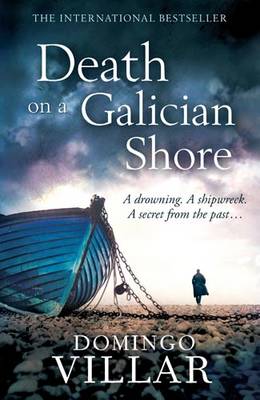
EURO CRIME
Reviews

Villar, Domingo - 'Death on a Galician Shore' (translated by Sonia Soto)
Trade Paperback: 384 pages (Apr. 2011) Publisher: Abacus ISBN: 0349123411
Inspector Leo Caldas of the Viga police is visiting his father in the countryside of this region of northern Spain when he receives a phone call from his office to tell him that a fisherman has been drowned at sea. At first he assumes that the death was suicide – but the autopsy reveals that this explanation is highly unlikely. The man was last seen setting to sea very early the previous Sunday morning, and the case seems to be one that will be impossible to solve, given the lack of any clues or witnesses.
Caldas and his sidekick Estevez, who here is fitting into the Viga lifestyle much more smoothly than in the previous (first) novel in the series, WATER BLUE EYES, travel to the fisherman's village to interview anyone who might have known the dead man. This process provides the author with the opportunity to describe the ways of life of these people, from their fish auctions every morning (where the price starts high and goes lower until a bid is received), to their methods of fishing an increasingly depleted ocean, to their struggles to live in their long-established ways against an unstoppable tide of developers and holiday homes. Caldas broods persistently on the case and the various inconsistencies that come up, finding just enough information to motivate him to continue but never enough to work out how or why the man died.
At the same time, Caldas himself is a fish out of water in this nautical setting. He is very fond of his father but cannot acknowledge it, he misses his long-dead mother, and he's also missing his ex-partner Alba, but cannot admit that either. A theme in this book is the bond that Caldas witnesses between his father and uncle, as a result of his uncle's hospital treatment for a very serious illness. Caldas is also drawn in to his father's "Book of Idiots", being regularly interrupted by the older man with requests for the names of half-remembered people who need to be included in it.
Most of the time, however, Caldas is on his own - at work, smoking too much, or frequenting a particular bar where he eats and asks occasional questions of a group of retired academics who seem to live there permanently. Caldas takes part in a regular local radio phone-in show, which he despises but is very popular with almost everyone he meets (frequently causing people usually suspicious of the police to talk openly to him). These themes were first presented in WATER BLUE EYES, and in the current novel the author does not take them much further, though we do learn a few more details about Caldas's personal life than were revealed in the earlier book.
The criminal case in DEATH ON A GALICIAN SHORE is not a complicated one, in the sense that Caldas soon realises that the key is in a tragedy that happened some years ago, involving the victim. Once he has uncovered the old details, he thinks he will understand what happened in the present day. The author is not tempted to throw in additional dead bodies, or provide action or violence to engage the reader's attention. Rather, he provides a measured account of this beautiful region of Spain and its inhabitants as Caldas travels about digging into the past, so we become absorbed in the ways of life there. This slightly one-dimensional approach to the mystery means that the solution, when it arrives, seems less relevant than our sorrow in leaving behind the evocative descriptions and evident affection the author has for traditional Galicia and its inhabitants.
Read another review of DEATH ON A GALICIAN SHORE.
Maxine Clarke, England
April 2011
Details of the author's other books with links to reviews can be found on the Books page.
More European crime fiction reviews can be found on the Reviews page.